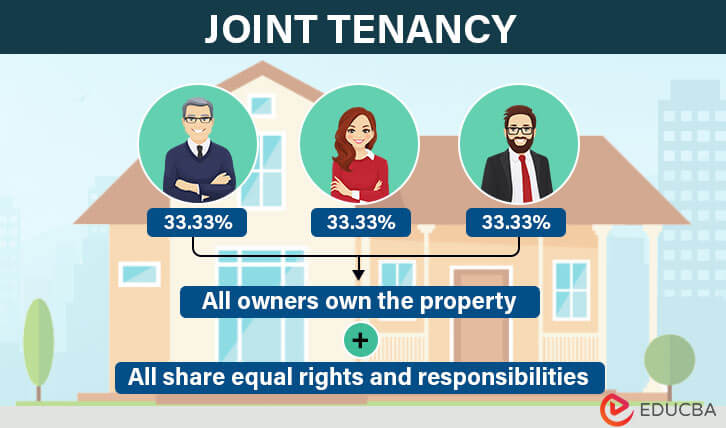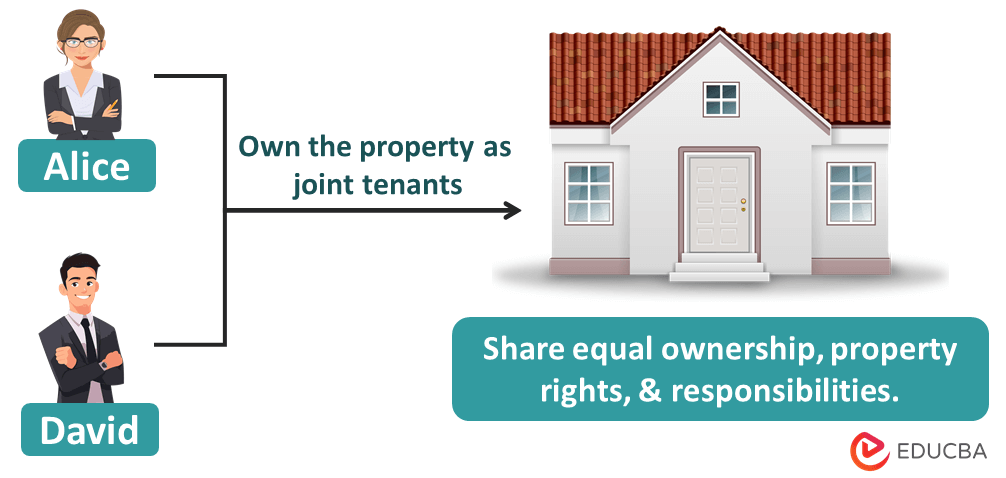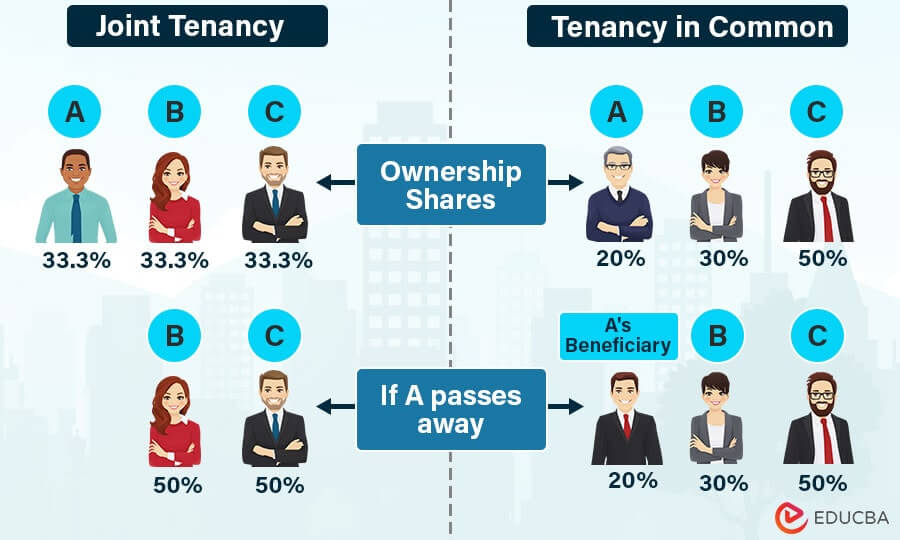Updated October 20, 2023
What is Joint Tenancy?
Joint tenancy is when two or more parties have mutual legal ownership of a real estate, meaning they share equal rights, responsibilities, and obligations. Apart from real estate, it also applies to assets like bank accounts and investment properties.
Here are some of its key features:
- All joint tenants own equal ownership rights of the property, including equal rights for paying property taxes, maintaining the property, and other responsibilities.
- If there are only two parties, ownership is divided equally, and each party owns 50% of the shares.
- Any tenant can access the property at any time, separately or together.
- The tenant may only sell their property with the consent of the other co-tenants.
Table of Contents
Joint Tenancy with Right of Survivorship
In the past, transferring property from a deceased person’s name to the current holder required a lot of time and financial resources. Therefore, the primary purpose of establishing joint tenancy was to simplify the lengthy ownership transfer process. Thus, the right to survivorship is one of the primary features of a joint tenancy.
It includes the following regulations:
- It states that if any co-owner of a property passes away, the property automatically transfers to the surviving co-owner and not the deceased’s family.
- The co-owners gain full ownership rights and mortgage responsibility for the property.
- This transfer happens without a will or probation.
How to Create it?
The following are the four requirements or units that must exist simultaneously to create a joint tenancy.
- Time: The first requirement is the unity of time. It means that all co-owners must want to buy the prosperity or join the joint tenancy at the same time. For instance, if a co-owner is added a year later, there is no unity of time.
- Title: All joint tenants must hold the ownership of the property under the same deed or legal document. This ensures that the co-owners are recognized as joint tenants and not as tenants in common. It also ensured that there were no duplicate documents for the same property.
- Interest: In a joint tenancy, each co-owner must have an equal, undivided portion of the property. This implies that each owner has the same ownership share in the entire property, and their ownership stakes cannot be split or divided.
- Possession: Possession means that all joint tenants have an equal right to use and possess the entire property without the consent of other co-owners. It implies that no joint tenant can claim exclusive rights to any specific part of the property.
Example #2:
Suppose three siblings inherit a family farm and decide to co-own it using joint tenancy. After a few years, one of the siblings passes away, and the family farm automatically passes to the surviving siblings.
Example #3:
Sarah and Andrew are business partners who decide to start a small business. They require office space, so they purchase commercial property as joint tenants. In the unfortunate event of Sarah’s passing, Andrew inherits her share in the property, ensuring that the business will continue to operate without disruption.
However, as the sole surviving tenant, Andrew will also have to bear the financial burden associated with the business property. It includes paying rent, utility bills, property maintenance costs, and other expenses on his own.
Benefits And Limitations
Here are some of the benefits and limitations of joint tenancy.
| Benefits | Limitations |
| It allows multiple individuals to share equal ownership of a property. | Equal ownership can lead to conflicts and disagreements. |
| In some cases, if one of the co-tenants faces a legal debt, the creditor cannot seize the property. | Property transfer might be complicated under certain circumstances, such as when all joint tenants die simultaneously. |
| Joint tenants may benefit from favorable capital gains tax treatment. | The disputes among joint tenants can complicate the sale or dissolution process. |
| Offers a simple way to dissolve the co-tenancy through sale or partition if one or more joint tenants wish to exit. | The deceased tenant has no control over who inherits their share; it automatically defaults to the surviving co-tenants. |
Tenancy in Common Vs. Joint Tenancy
The following are some differences between tenancy in common and joint tenancy.
| Joint Tenancy | Tenancy in Common | |
| Right of Survivorship | It includes the right of survivorship, meaning if one co-tenant dies, their share automatically transfers to the surviving co-tenant. | It does not include the right of survivorship, meaning if a co-tenant dies, their share will pass based on their will or the state’s inheritance laws. |
| Ownership Shares | Co-tenants have equal ownership shares. | Each co-tenant has individual ownership shares that may be equal or unequal. |
| Transfer of Interest | Allows dissolution of property through sales or partition but with all co-tenants consent. | Co-tenants can individually sell or transfer their ownership interest without the consent of the other co-tenants. |
| Capital Gains Tax on Sale | Joint tenants may benefit from favorable capital gains tax treatment. | Each co-tenant may be individually liable for capital gains tax on the sale of their share based on their ownership percentage. |
| Inheritance | Inheritance is simple, where the share automatically passes to surviving co-tenants. | Inheritance depends on the co-tenant’s will or estate plan. |
Frequently Asked Questions (FAQs)
Q1. Can I change my ownership share in joint tenancy?
Answer: No, in joint tenancy, each owner has an equal share in the property, and they cannot change their ownership shares. However, you can do so anytime if you want to transfer your ownership share to someone else.
Q2. Can creditors seize the property if one of the owners is sued?
Answer: If multiple parties own the property in joint tenancy, it may be protected from creditors if one of the owners gets sued. This is because the property is not considered an asset of the individual owner but rather an asset of the joint owners.
Q3. Do all owners have to agree on decisions related to the property in joint tenancy?
Answer: Yes, in joint tenancy, each owner has an equal say in the management of the property, and decisions related to the property must be made jointly. This can benefit couples and family members who want to ensure their voices are valued and heard in decision-making.
Q4. Can I convert my common tenancy to joint tenancy?
Answer: Yes, it is possible to convert your common tenancy to a joint tenancy, but it is important to understand its legal implications.
Recommended Articles
We hope you found this EDUCBA information about Joint Tenancy useful. For more guidance and economic-related articles, read these recommendations below:





